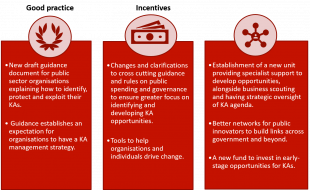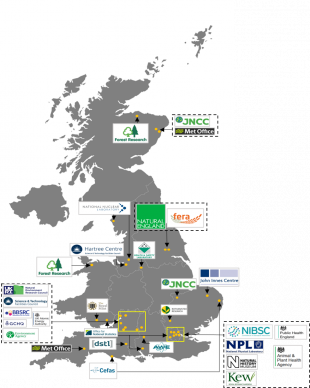The UK’s public sector is a remarkable source of innovation; it is bursting with potential and is rich with ideas and insights that could help to shape the future of the UK as we emerge from the coronavirus pandemic. From the Ministry of Defence’s innovative sepsis test which could save millions of lives globally to Met Office weather sensors that may make possible the next generation of autonomous vehicles, we are already in the vanguard of technological progress.
The Knowledge Assets team are pleased to announce that on 20th April, HM Treasury and the Department for Business, Energy, and Industrial Strategy (BEIS) published a new report (‘Getting smarter: a strategy for knowledge & innovation assets in the public sector’) and draft guidance to support the effective management of public sector knowledge and innovation assets.
Government support for UK public sector innovators announced:
The new ‘Getting Smarter’ report sets out an implementation strategy that focuses on overcoming the barriers identified in the Budget 2018 report and industry expert, Dr Andrew Mackintosh, advised HMT on its development. The strategy is built around three pillars: good practice, incentives and support (shown in figure below), which will help provide clarity to organisations about how to manage their knowledge assets and unlock their potential.
The key deliverables of the implementation strategy are to set up a new strategic capability unit (The Government Office for Technology Transfer) and fund to improve how we manage, develop and invest in public sector knowledge assets. At the Spending Review 2020, funding of up to £17 million in 2021-22 was announced to help establish these key deliverables which will, in turn, help public sector knowledge assets translate into new high-tech jobs, businesses and economic growth.
The implementation strategy’s three pillars

The newly published draft guidance strongly recommends that organisations in scope (those headed by an Accounting Officer responsible for upholding Managing Public Money (MPM)):
- develop a strategy for managing their knowledge assets, as part of their wider asset management strategy (a requirement of MPM)
- appoint a Senior Responsible Owner for knowledge assets who has clear responsibility for the organisation’s knowledge asset management strategy
During 2021, the Knowledge Assets team will invite public sector organisations headed by Accounting Officers responsible for upholding MPM to test the guidance and provide feedback. The team will plan to refine and iterate the document in response to the feedback, before hard launching the document later in 2021. The new unit, once established, will be able to offer support to organisations in implementing this guidance.
Why is it important to manage knowledge assets?
The strategic management of knowledge assets is important to the efficient and effective use of resources within any organisation. For example, it allows an organisation to identify their assets and use them fully to meet the organisation’s needs; save resources by avoiding duplication in the acquisition or creation of knowledge assets; and lowering the risk of infringing the Intellectual Property (IP) of others.
Additionally, in the UK public sector, these assets are fundamental to the successful delivery of government’s objectives and can bring significant social, economic, and financial benefits.
The Knowledge Asset programme’s key deliverables:
The new unit that will be established within BEIS, The Government Office for Technology Transfer, will scout for new knowledge asset opportunities and support government departments and organisations on how to identify, protect and exploit their knowledge assets. This includes responsibility for taking forward the implementation strategy for better management of knowledge assets. The unit will also exercise strategic cross-government leadership and increase awareness and capability including through training and the facilitation of better networks for public sector innovators.
The new fund will invest in innovative ideas developed within the public sector, benefitting both the public sector and the wider economy. This fund will support departments and their partner organisations as they develop and exploit early-stage public sector knowledge assets and attract private investment. The UK Innovation and Science Seed Fund (UKI2S) has a strong track record of enabling and accelerating the commercial success of innovative companies stemming from the UK’s research base. The expansion of UKI2S will be explored as part of the plan to provide dedicated investment funding for knowledge assets. The unit will also distribute smaller amounts of grant funding.
Map showing selection of knowledge asset generating public sector organisations [1]
This map below provides a snapshot of some of the UK-wide institutions which generate high-potential knowledge assets. This does not include a number of strong research institutes within the devolved administrations, such as the James Hutton Institute in Scotland. While outside the scope of this study, strong collaboration will be sought as the programme develops.

[1] Note: Fera is a joint venture between Capita and Defra, while Atomic Weapons Establishment (AWE) work under contract to the Ministry of Defence through a government-owned-contractor-operated arrangement.
Leave a comment